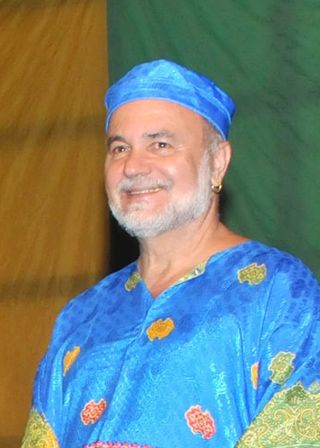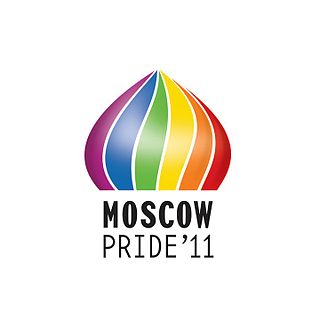Related Research Articles

Michelangelo Signorile is an American journalist, author and talk radio host. His radio program is aired each weekday across the United States and Canada on Sirius XM Radio and globally online. Signorile was editor-at-large for HuffPost from 2011 until 2019. Signorile is a political liberal, and covers a wide variety of political and cultural issues.
"New queer cinema" is a term first coined by the academic B. Ruby Rich in Sight & Sound magazine in 1992 to define and describe a movement in queer-themed independent filmmaking in the early 1990s.

Luiz Roberto de Barros Mott or Luiz Mott in São Paulo, is an anthropologist and a gay rights activist in Brazil.

American singer and actress Madonna is an ally recognized as a gay icon. She was introduced, while still a teenager, by her dance instructor, Christopher Flynn, an openly gay man who mentored her. Since then, Madonna has always acknowledged the importance of the community for her life and career, declaring that she "wouldn't have a career if it weren't for the gay community".
Sean O'Brien Strub is an American writer, activist, politician and entrepreneur. He is a pioneer expert in mass-marketed fundraising for LGBT equality.
This is a list of notable events in the history of LGBT rights that took place in the 1970s.
Michael Shernoff was an American openly gay psychotherapist who specialized in serving the mental health needs of gay, lesbian, and bisexual people and was author of several influential publications on the topics of HIV/AIDS prevention and the mental health concerns of gay men.

Although life in modern Russia allows many more liberties for gay men and lesbians than it did before the fall of communism, unofficial discrimination and fear are still rampant. "It would be foolish to interpret some new freedoms as tolerance," said Igor Kon, a sociologist who is Russia's best-known expert on sexual practices, and author of The Sexual Revolution in Russia. Gay life in Russia is less open than in Western countries. With more quickly growing acceptance, major cities like Moscow and St Petersburg now have LGBT clubs and venues.
Communist attitudes towards LGBT rights have evolved radically in the 21st century. In the 19th and 20th century, communist parties and Marxist–Leninist states varied on LGBT rights; some Western parties were among the first political parties to support LGBT rights, while others, especially the Soviet Union and its Eastern Bloc, harshly persecuted people of the LGBT community.

The history of lesbian, gay, bisexual and transgender people (LGBT) in Russia and its historical antecedents has largely been influenced by the political leanings of its rulers. Medieval Catholic-Protestant Europe had the largest influence on Russian attitude towards homosexuality. Russian LGBT history was influenced by the ambivalent attitude of the Russian Orthodox religiosity regarding sexuality.

Michael Anthony Petrelis is an American AIDS activist, LGBTQ rights activist, and blogger. He was diagnosed with Acquired Immunodeficiency Syndrome (AIDS) in 1985 in New York City, New York. As a member of the Lavender Hill Mob, a forerunner to the AIDS Coalition to Unleash Power, he was among the first AIDS activists to protest responses to the disease. He was a co-founding member of ACT UP in New York City, New York, and later helped organize ACT UP chapters in Portland, Oregon, Washington, D.C., and New Hampshire, as well as the ACT UP Presidential Project. Petrelis was also a founding member of Queer Nation/National Capital, the Washington D.C. chapter of the militant LGBTQ rights organization.
This is a timeline of notable events in the history of non-heterosexual conforming people of South Asian ancestry, who may identify as LGBTIQGNC, men who have sex with men, or related culturally-specific identities such as Hijra, Aravani, Thirunangaigal, Khwajasara, Kothi, Thirunambigal, Jogappa, Jogatha, or Shiva Shakti. The recorded history traces back at least two millennia.
AIDS Bhedbhav Virodhi Andolan was the first HIV/AIDS activist movement in India founded in 1988 in New Delhi. The group received popular recognition with the publication of its pioneering report "Less than Gay" in 1991. Through this report, ABVA advocated for civil rights of LGBTQ people to include same sex marriage, LGBT parenting, and the decriminalization of homosexuality through the repeal of Section 377 of the Indian Penal Code. In 1994, ABVA filed the first petition challenging the constitutionality of Section 377 in the Delhi High Court, in order to challenge prison authorities' ban on condom distribution.
Gender roles in non-heterosexual communities are a topic of much debate; some people believe traditional, heterosexual gender roles are often erroneously enforced on non-heterosexual relationships by means of heteronormative culture and attitudes towards these non-conformative relationships.

Lesbian, gay, bisexual, and transgender (LGBT) persons in the former Soviet Union face legal challenges not experienced by non-LGBT residents.

Malcom Gregory Scott also known as Greg Scott, is an American writer, activist, and AIDS survivor. In 1987, the United States Navy (USN) discharged him for homosexuality, after which Scott worked to overturn the Department of Defense (DoD) directive prohibiting the military service of lesbian and gay Americans. Upon his discharge, Scott also learned he had tested positive for the human immunodeficiency virus (HIV), the virus that causes acquired immunodeficiency syndrome (AIDS). He was active in the Washington, D.C., chapters of ACT UP and Queer Nation. Scott was an advocate for legal access to medical marijuana, a critic of early HIV prevention education strategies, and a proponent for expanded academic research to support the public policy goals of queer communities. American journalist Michelangelo Signorile once called Scott "the proudest queer in America." Scott worked as a writer for Fox Television's America's Most Wanted, and his writing has appeared in several newspapers and magazines. Scott nearly died of Stage IV AIDS in 1995 and credited marijuana with his survival until effective anti-retroviral therapies became available.
Carlos Jáuregui was an Argentine LGBT rights activist. He founded La Comunidad Homosexual Argentina in 1984. In the early 1990s, he set up Gays por los Derechos Civiles and organised the first Pride march in Buenos Aires. He died from an HIV-AIDS-related illness at the age of 38. In memorial, a national day of activism for sexual diversity was established. He was posthumously given the Felipa de Souza Award, and, in 2017, a station was renamed after him on the Buenos Aires Underground.
Evgenia Evgenievna Debryanskaya or Yevgenia Debryanskaya is a Russian dissident and LGBT rights activist.
References
- ↑ Ridinger, Robert B. (2014). Speaking for Our Lives: Historic Speeches and Rhetoric for Gay and Lesbian Rights (1892-2000). New York, NY: Routledge. p. 625. ISBN 978-1-56023-174-5.
- ↑ Essig, Laurie (1999). Queer in Russia: A Story of Sex, Self, and the Other. Durham, NC: Duke University Press. p. 59. ISBN 978-0-8223-2346-4.
- 1 2 Marsh, Rosalind J.; Marsh, Rosalind (1996). Women in Russia and Ukraine. Cambridge, UK: Cambridge University Press. pp. 166–167. ISBN 0-521-49522-9.
- ↑ Adlam, Carol (2017). A Tradition of Infringement: Women in Russian Literature After Glasnost. Routledge. ISBN 978-1-351-19713-7.
- 1 2 3 Shane, Scott (May 9, 1991). "Homosexual-rights activist brings zest to campaign". Baltimore Sun. Retrieved 2022-12-01.
- ↑ Либертарианцы: Президент может быть гомосексуалистом [Libertarians: The President may be homosexual] (in Russian). Власть. 1991-04-29. Archived from the original on 2013-04-09. Retrieved 2009-03-19. Около 700 делегатов Либертарианской партии … отметили праздник 1 Мая … выдвижением на пост президента России своего человека. Им стал лидер партии гомосексуалист Роман Калинин.[About 700 delegates of the Libertarian Party … celebrated May Day with … the nomination of their person for the post of President of Russia. He became the leader of the party homosexual Roman Kalinin.]
- ↑ Tuller, David (2016-01-29). "In and out in '90s Russia". Coda Story. Retrieved 2022-12-01.
- ↑ "«Вы словно ходите по лезвию ножа» — общественные новости". rusplt.ru (in Russian). Retrieved 2022-12-01.
- 1 2 Ridinger, Robert B. (2012). Speaking for Our Lives: Historic Speeches and Rhetoric for Gay and Lesbian Rights (1892-2000). New York: Routledge. p. 625. ISBN 978-1-56023-174-5.
- ↑ Lenskyj, H. (2014-02-07). Sexual Diversity and the Sochi 2014 Olympics: No More Rainbows. Springer. ISBN 978-1-137-39976-2.
- ↑ Buyantueva, Radzhana (2022). The Emergence and Development of LGBT Protest Activity in Russia. Cham, Switzerland: Springer Nature. p. 53. ISBN 978-3-031-14890-3.
- ↑ "Dusty Pruitt & Roman Kalainin". Advocate. 929: 38. December 21, 2004.
- ↑ Pope, Cynthia; White, Renee T.; Malow, Robert (2014). HIV/AIDS: Global Frontiers in Prevention/Intervention. Oxon: Routledge. ISBN 978-1-136-78029-5.
- 1 2 Essig, Laurie (1999). Queer in Russia: A Story of Sex, Self, and the Other. Durham: Duke University Press. p. 85. ISBN 978-0-8223-2346-4.
- ↑ Tuller, David (1996). Cracks in the Iron Closet: Travels in Gay and Lesbian Russia. University of Chicago Press. p. 115. ISBN 0-226-81568-4.